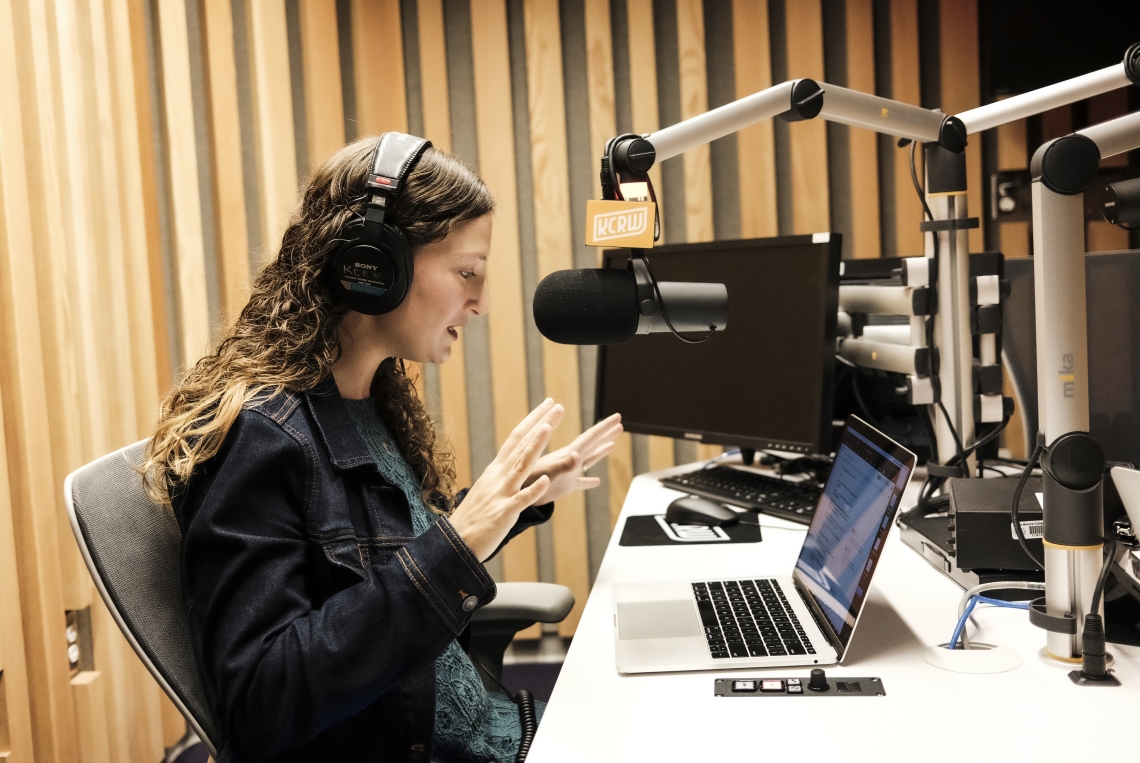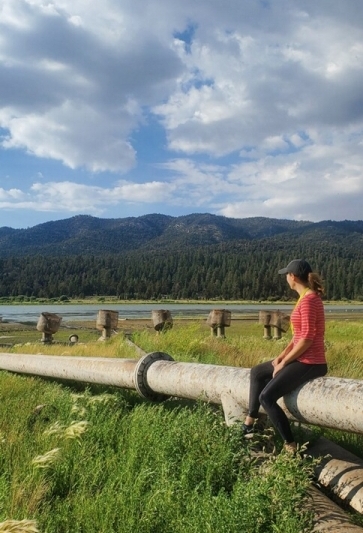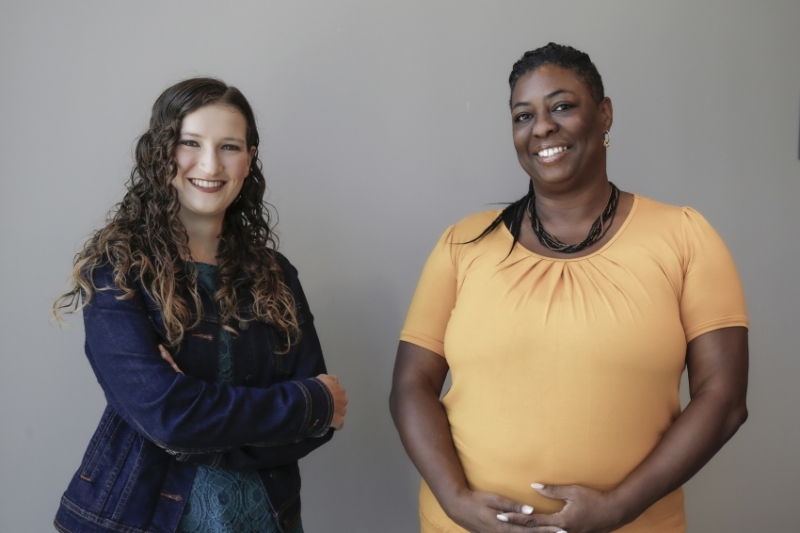
Caleigh Wells ’17 Found Her Calling in Climate Reporting The reporter and podcast host won a 2023 National Edward R. Murrow Award for her part in BURNED, which investigated failures by the U.S. Forest Service to protect California towns from potential high-risk wildfires.
Though her childhood home remained unscathed, the 2018 Woolsey Fire, which burned more than 96,000 acres in western Los Angeles County, scorched the neighborhood where Caleigh Wells ’17 grew up. On assignment as a temporary reporter for KPCC, an affiliate of NPR for the greater L.A. area, she walked the once familiar area that was almost unrecognizable. The house across the street on the corner from her family home burned down, as did three more on an adjacent block.
Through an acquaintance, she found the focus of her story: a man in a neighboring town who fought the fire on his own for three days to protect his home.
“He was spraying it with his own hose while the barn in his backyard was burning down, and he was saving his animals,” said Wells. “While I don’t endorse staying when they tell you to evacuate, this guy is the reason his house didn’t burn down.
“He starts talking about how his neighbors who brought hay for his horses, and he broke down crying,” Wells added. “None of the other things — the incredible trauma that he went through — none of that fazed him. But as soon as he started talking about how his neighbors were showing him kindness, that’s when he lost it. There’s something about how a natural disaster brings people together and shows the really good parts of humanity that is so inspiring.”
While studying journalism at Washington and Lee University and in graduate school at the University of Southern California, Wells thought her future would be in front of the camera, but radio jobs kept landing in her path. As she talked with the man combating the wildfire, following a week of covering midterm elections and the Borderline Bar and Grill shooting in Thousand Oaks, California, the value of radio — and her part in it — clicked for Wells.
“It was that week of talking to people about their country and democracy, then talking to someone about the tragedy of the shooting and then talking to someone about the beauty of humanity helping each other,” she said. “I was like, ‘This is it.’ I can’t picture another journalism medium where I would have been able to tell that better.
“There’s something so intimate about listening to a voice, but still the listener gets to use their imagination to craft the scene, that is so poetic and beautiful,” Wells said. “Once I got into radio I just never looked back, and I don’t want to leave it. I really like being in this medium even as it struggles. It’s worth being in.”
Finding Her Niche
Wells thought she would become an author, but midway through her senior year of high school she shifted her focus to journalism, and W&L’s accredited journalism department pulled her to Lexington. She triple-majored in journalism, sociology and politics and minored in women’s, gender, and sexuality studies. She also helped restart a chapter of service fraternity Alpha Phi Omega, sang in General Admissions for two years and competed on the W&L riding team, where she was on the winning 2014 Old Dominion Athletic Conference Championships team and co-captained her final two years.
“I feel like 90% of being an adult is showing up; I learned how to just do that at W&L,” Wells said. “It is shocking how many people in life just don’t show up — physically, mentally or emotionally. Being a student-athlete was majorly important. The soft skills required for time management, collaboration and supporting other team members — there’s value in doing that, and that’s important in a newsroom, too.”
The nature of the practicum-based journalism major, with the requirement to seek out stories in the community and turn them around on a weekly basis for Rockbridge Report as a writer, producer and reporter (depending on the semester), set her up for her master’s degree and job in the field.
“The thing that [other] journalism students frequently graduate without is the ability to walk up to a stranger and interview them,” she said.
When studying journalism at W&L and at USC, she never considered which beat she’d focus on; she just wanted to talk about subjects and events that mattered. But in 2018, while Wells was working as a general assignment reporter at KPCC, her husband, Austin Frank ’17, started experiencing anxiety specifically focused on climate change. In an effort to help him, she researched ways they could limit their carbon footprint. They began to eat less meat, started composting and replaced her car with a plug-in hybrid.
In 2019, when she started in her current role as a reporter at KCRW, another NPR affiliate in L.A., she pitched climate stories. She felt that her husband’s anxiety wasn’t singular to just him and that her audience probably struggled with similar existential fears.
“I wanted to give my audiences the same kind of agency to make them feel like they are empowered to participate in the climate solution — that they aren’t just victims and passengers in this terrible thing that’s happening,” she said. “We really do have the ability to move the needle.”
To further empower her listeners, Wells started hosting a podcast in 2023 with environmental educator Candice Dickens-Russell called “The Anti-Dread Climate Podcast.” Similar to NPR’s “Life Kit,” they wanted the podcast to follow a how-to format tailored specifically around climate consciousness with each episode answering a listener’s question and sharing actionable steps. When KCRW put out a call for questions, they were flooded with more than 100 responses. Episodes have focused on everything from how to talk to children about climate change without worrying them, everyday decisions that affect climate change and how to discuss the subject with someone who doesn’t agree with your viewpoint, with Wells’ mom as a special guest.
At the same time, she continued reporting for KCRW, officially becoming their climate reporter in 2022, as well as pitching freelance stories to NPR and Marketplace. In the aftermath of the 2021 Caldor Fire that burned Grizzly Flats, California, she started a years-long investigative project with fellow NPR affiliate CapRadio’s Scott Rodd. When reporting on the tragic story of Grizzly Flats, Rodd learned that the tens of thousands of acres of U.S. Forest Service land surrounding the town were long overdue for management, and, had those lands been maintained, it was likely that Grizzly Flats wouldn’t have burned down. They wondered where else this could be the case, which led Wells to Big Bear Lake, California, a small mountain town of 5,000 permanent residents.
“Everybody in Southern California knows it, and if you’ve ever gone snowboarding, you’ve probably gone there,” Wells said. “It is completely surrounded by tens of thousands of acres of land that has been earmarked for forest management work.”
Wells documented how management work (such as tree thinning and brush clearing), scheduled from as early as the mid-2000s, went unattended due to fewer number of days in which a prescribed burn can be safely administered because of increasingly higher temperatures, lack of monetary funds and personnel resources being stretched thin due to fighting wildfires in the area.
The reporters’ joint story, BURNED, garnered attention when it aired on CapRadio in November 2022, with pieces of the investigation airing nationwide. California senators Dianne Feinstein and Alex Padilla, along with a handful of other politicians, signed a letter to the Forest Service demanding an explanation for the findings. The ACRES Act passed in the House of Representatives in September 2023, requiring that the Forest Service accurately log its management work; Wells and Rodd’s investigation was referenced in the supporting materials. In addition, the Proven Forest Management Act and the BUILDER Act, both introduced to the House, cite BURNED. Because of their efforts, the reporting team won a 2023 National Edward R. Murrow Award.
“The feeling of needing to do something that matters is huge,” Wells said. “The good news is with the climate beat, it always feels like everything I’m doing matters. I’m in public radio; I’m not here to make money. I’m here to try and make a difference, and it does feel like we get to do that.”
 Caleigh Wells ’17 went on assignment to Big Bear Lake, California, for her part in the BURNED investigation. Big Bear Lake was in such a drought that the snow makers were visible.
Caleigh Wells ’17 went on assignment to Big Bear Lake, California, for her part in the BURNED investigation. Big Bear Lake was in such a drought that the snow makers were visible. Caleigh Wells ’17 (left) hosts “The Anti-Dread Climate Podcast” with Candice Dickens-Russell.
Caleigh Wells ’17 (left) hosts “The Anti-Dread Climate Podcast” with Candice Dickens-Russell.
You must be logged in to post a comment.